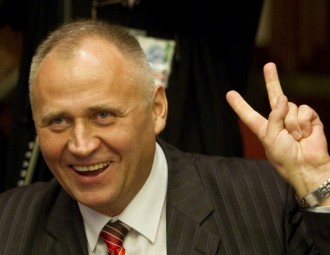Belarus’ centre-right parties try to take initiative to unite opposition from the democratic parties

Opposition parties have no interest in integration into a consolidated movement. Most of them would agree to unite during the parliamentary campaign, while preserving institutional autonomy.
Centre-right coalition members would like to hold a round table for the opposition leaders.
Nikolai Statkevich and his counterparts had tough luck with recruiting new activists at protest rallies during the 2015 presidential election and post-election period, which prompted them to speak up for the united opposition and the Congress of Democratic Forces (CDF). Yet they have been unable to engage oppositional organizations, which are well-represented in the regions. The CDF organising committee includes only well-known intellectuals and leaders of the opposition structures with small capacity.
Oppositional leaders probably think that if they join the Congress, they would enhance the position of former candidate and former political prisoner Nikolai Statkevich. Under favourable circumstances, he could aspire to become a single opposition leader. So far, Statkevich has accepted all requirements, which were put forward by his partners in the Congress during the negotiations. This could mean that the former political prisoner No 1 is rushing to hold the Congress while he is still popular, including among activists.
Since political parties have refused to cooperate, the Congress initiators started making field trips to the regions in order to recruit new activists at the spot. That said, Statkevich and his counterparts seem to have forgotten to coordinate their activity with leaders of opposition parties, which has led to some tension in their relations. For instance, many regional oppositional parties’ co-ordinators and leaders ignored meetings with the Congress initiators, despite the participation of parties’ activists.
In the public domain, opposition leaders tend to avoid open and harsh mutual criticism. The centre-right coalition leadership emphasised that it was not against their activists taking part in meetings with Statkevich and their participation in the Congress. Meanwhile, in defiance of the Congress organisers, the centre-right coalition has proposed to organise a round table to discuss cooperation among the opposition parties. Apparently, with their initiative the centre-rightists would like to seize the initiative from Statkevich and prevent activists’ outflow to the new opposition movement, which may form after the Congress.
That said, opposition leaders are unlikely to speak out against the Statkevich’s initiative to unite the opposition in a fight against the regime. The united opposition with a single leader is a very popular idea in the Belarusian media. In addition, a single opposition leader as an alternative to the incumbent president would also appeal to many Belarusians critical of the authorities, unlike a dozen of opposition leaders with low popular ratings.
Nikolai Statkevich is rushing to capitalize his leadership potential and popularity among activists before the parliamentary campaign kicks off. A sharp critic of the authorities and an active participant in protest rallies, former political prisoner Statkevich has remained popular among irreconcilable opponents of the current authorities. In addition, Congress initiators seek to create a coordination body in order to coordinate activities of the Congress participants.
That said, Congress supporters lack human capacity to nominate their candidates to the Parliament, unlike structured opposition. Low mobilization capacity of the Congress organisers is likely to bring down the popularity of the single leader idea (the centre-right coalition has nominated 93 candidates in addition to candidates from the Belarusian Popular Front, "Tell the Truth", Belarusian Social Democratic Party (Hramada) and the "Fair World" party).
By all appearances, if structured opposition refuses to participate in the Congress, Statkevich’s initiative may lead to the creation of yet another opposition movement or a coalition. Such a coalition may commit to the following ideas: European integration, opposition to the "Russian world", regime change in the country, and, potentially, disrupting the unconditional normalisation between the Belarusian officials and Western capitals.
-
03.01
-
07.10
-
22.09
-
17.08
-
12.08
-
30.09








































